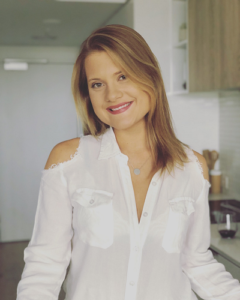Putting fire in the belly of eating disorder recovery services
Putting fire in the belly of eating disorder recovery services

Lived experience, from people who have experienced an eating disorder, and people who have been caregivers, is finding a place in the heart of treatment strategies.
Eating disorder support services are under-developed. A lot of people with an eating disorder have suffered and continue to suffer under current treatment systems. Polarizing views on how eating disorders should be treated, who is angry at who, and who knows best, detract from our ability to create positive change. Imagine if all of this fire was directed toward growing our services?
So, what can be done right now?
After navigating recovery from my own eating disorder several years ago, I recognized firsthand the lack of support services available for those seeking help. Today I am one of four certified eating disorder coaches in Australia, and the founder of Uncovery.
An urge to discover what is missing
When I wanted to get well I realized that to do so I would need to find my own resources, and figure the recovery path out myself. When I emerged from my illness, I had an intense fire in my belly to find out what the rest of the world was doing to treat eating disorders.
I knew there had to be more than what Australia was currently offering, and I wanted to know why it hadn’t been done yet.
After working for six months as a residential treatment liaison and recovery coach at BALANCE eating disorder treatment center in New York City, and travelling the states picking the brains of professionals in the field, I returned home with overflowing urgency to create something that could positively influence the landscape of eating disorder treatment in Australia.
I was both inspired and intrigued to see that the United States had many levels of treatment. A stepped care system of treatment means that support can be available for each stage of recovery. From inpatient residential treatment in beautiful home-like settings, to partial hospitalization programs, to outpatient treatment and more.
Understanding that Australia has a very different medical system to US, I still couldn’t fathom why Australia didn’t have programs like these. What I did know was that change needed to happen, and that I was sure it was possible. One of the most pivotal learnings I had through my work in the US was the value and importance of lived-experience at the heart of a treatment strategy.
Rigorous training for coaches
Carolyn Costin, founder of Monte Nido, had been an inspiration for me, and I resonated deeply with her treatment model. I was motivated to train with The Carolyn Costin Institute, and to become an eating disorder coach through Carolyn’s Certified Eating Disorder Coaching Course. I am apprehensive about using the world holistic, but I truly believe Carolyn’s approach to treating eating disorders fits this description. Carolyn had been utilizing recovered individuals as a part of her treatment strategy for decades. After selling Monte Nido in 2015, Carolyn established The Carolyn Costin Institute where she takes prospective coaches through a rigorous training and program with extensive supervision, teaching concepts that she has used for the past 30+ years in the industry.
Months after completing my coaching course, I was accepted by the Foundation for Young Australians into the Young Social Pioneers Program, for my innovation efforts toward creating new pathways for eating disorder treatment and care within Australia. My grand plans to create monumental change were quickly pulled in. This was when it struck me: creating sustainable social change doesn’t come from turning the current system on its head, but by befriending the system, and working in unity.
Helping to fill the gaps in care
All of a sudden, my plans to pursue eating disorder coaching on the side to pay bills whilst working on bigger projects, became front and center. To create change, I needed to let go of the ‘big stuff’, and focus on a skill I had at my fingertips. Eating disorder coaching. After three months of deep-diving into the program, I was able to develop a solution to the problem. I discovered that rather than making a case on why our system was wrong, I needed to help fill the gaps, and create more services that facilitate recovery. As a result, Uncovery was born.
Practical and compassionate support and guidance
Eating Disorder coaching offers support for the ‘practical’ side of recovery. We work as an adjunct to a clinical team, helping our clients to implement critical treatment goals in their day to day life. We are trained to use appropriate challenge, exposure and response prevention, as well as lived-experience, to provide compassionate support and guidance. At Uncovery, we do this through a range of practices. One of the most beneficial services we offer are meal supports. Because let’s face it, it is impossible to recover without dealing with the food.
Re-learning in everyday situations
Most often we work closely with the dietitians’ goals and meal plan, to help the person to implement them in the real world. This offers exposure not only to the food that may be challenging, but also supports the person in re-learning how to navigate a restaurant menu, eat in a social environment, and challenge their food rules and fears with someone who has walked a similar path. It is the coaches’ role to guide the person through any triggers or urges that arise and ensure that they have the best support possible.
We offer individual sessions, where we build trust and establish what challenges the person is facing. We will co-create goals with the client and their treatment team, developing a plan of action to overcome these challenges. Whatever the goal, be it re-learning how to cook and prepare food in your home, shop for groceries or purchase clothing whilst moving through recovery, we adapt the service to best fit individual needs, and help to deal with the triggers as they arise.
When we talk about ‘practical’, we mean exactly that. With support and guidance, we help the person recovering from an eating disorder to re-establish a relationship with food and their body through exploring the challenges faced in daily life, and develop new coping strategies and skills for a strong recovery.
Re-immersing in the mainstream
Overcoming an eating disorder not only requires the person to develop a new relationship with food and their body, but also to reconnect with the world in which they live. One of the most difficult parts of recovery can often be in the tasks that might seem simple to some, like having a meal in a restaurant, buying food in a supermarket, or going to a yoga class for the first time. This is where we see such necessity in eating disorder coaching.
We need to be thinking more laterally when we talk about eating disorder support. We need to begin looking at the problem we are faced with, and find sustainable solutions. If you are a health professional working with those experiencing an eating disorder, I urge you to think more broadly when it comes to helping your client. So, let us work in unity to give these people the best chance at recovery and freedom from their eating disorder.
Eating disorder coaching has the capacity to bridge some large gaps in the healthcare system, and give those who have recovered an opportunity to transform their lived-experience into a purposeful career.
About Carolyn
Carolyn Costin, MFT, is a world-renowned eating disorder clinician, speaker, consultant and the author of six books.
- Carolyn’s Coaching Program: https://www.carolyn-costin.com/coaching





